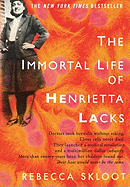
 In 1951, an African-American woman named Henrietta Lacks, raised by a tobacco sharecropper in a former slave cabin in rural Virginia, underwent an examination in the "colored-only" exam room at Baltimore's Johns Hopkins Hospital for what turned out to be the cervical cancer that would kill her in less than a year. During later treatment, and without her consent, her surgeon excised a dime-sized slice of cancerous tissue that would give birth to perhaps the most famous cells in medical history. The hardy, aggressive cells known as HeLa--some 20 metric tons of them cultured to date--have made their way into space and have spurred countless scientific advances, from polio vaccine to in vitro fertilization. In her first book, science journalist Rebecca Skloot uncovers their incredible story.
In 1951, an African-American woman named Henrietta Lacks, raised by a tobacco sharecropper in a former slave cabin in rural Virginia, underwent an examination in the "colored-only" exam room at Baltimore's Johns Hopkins Hospital for what turned out to be the cervical cancer that would kill her in less than a year. During later treatment, and without her consent, her surgeon excised a dime-sized slice of cancerous tissue that would give birth to perhaps the most famous cells in medical history. The hardy, aggressive cells known as HeLa--some 20 metric tons of them cultured to date--have made their way into space and have spurred countless scientific advances, from polio vaccine to in vitro fertilization. In her first book, science journalist Rebecca Skloot uncovers their incredible story.
Skloot became fascinated by Henrietta Lacks's life when she learned of it in a biology class in 1988. Her greatest challenge in the 10 years of active research and writing it took her to produce this remarkable account lay in overcoming the intense suspicion and resentment of Henrietta's children (who did not learn of her singular role in scientific research until more than 20 years after her death), born of the belief that their mother had been cruelly exploited by the medical establishment.
To accompany her mastery of the scientific dimensions of the HeLa cells' epic life, Skloot brings to this telling an uncluttered, novelistic prose style and the gifts of a natural storyteller. What gives her account its depth and luster is her intense engagement with the Lacks family, in particular daughter Deborah, and her sympathetic portrayal of their struggle to come to terms with Henrietta's legacy. "The Lackses challenged everything I thought I knew about faith, science, journalism, and race," Skloot writes, and she succeeds in recounting their frequently painful circumstances revealingly, but without any hint of exploitation.
Skloot skillfully explores the thorny medical controversies implicated in Lacks's case, most notably the nature of informed consent required when patient tissue is used in medical research and whether patients should be compensated by those exploiting that tissue for commercial gain. Alongside these questions she probes disturbing issues of race and class that are, sadly, integral parts of the tale.
It's worth pondering what a simple woman like Henrietta Lacks--who was buried in an unmarked grave in a town that's no longer on the map--would make of her own compelling afterlife. While it's hardly recompense for half a century of anguish, the Lacks family has attracted a worthy chronicler in Rebecca Skloot. It's a safe bet her gripping medical saga and family drama will find its way, deservedly, onto many critics' "Best of 2010" lists. --Harvey Freedenberg
Shelf Talker: Combining a fascinating medical story with an intense family drama, Rebecca Skloot's account of the famous HeLa cells is as compelling as many novels.

